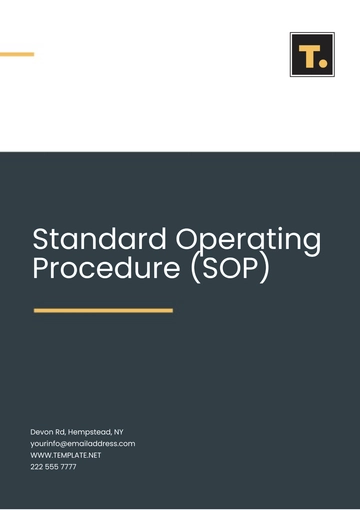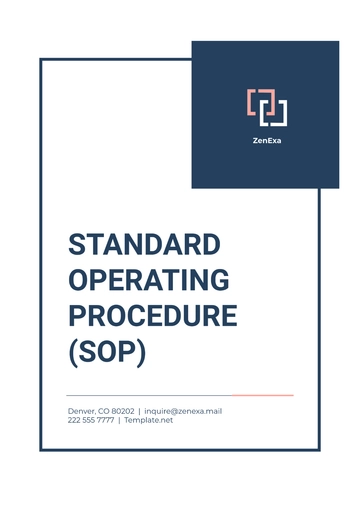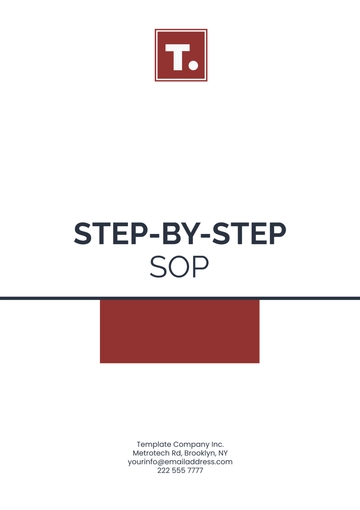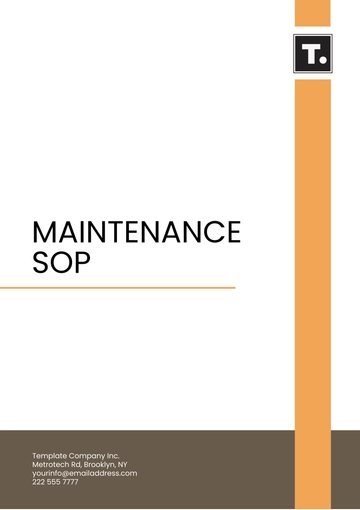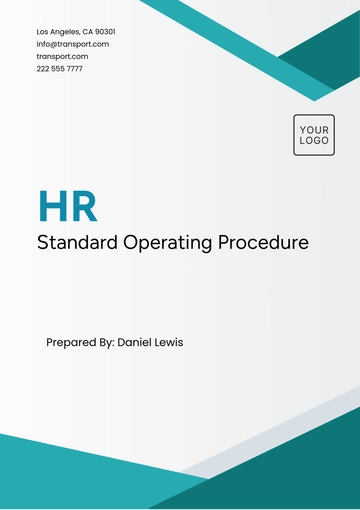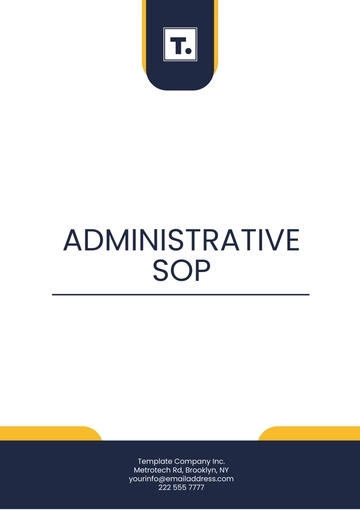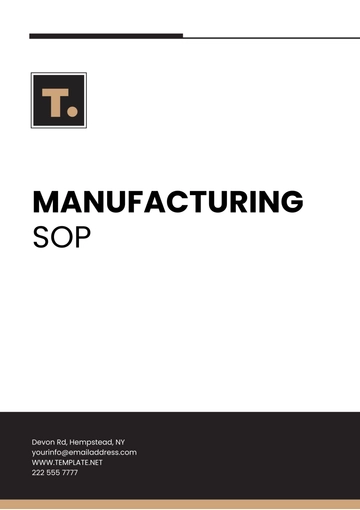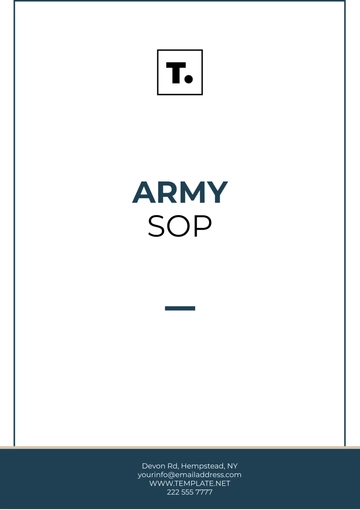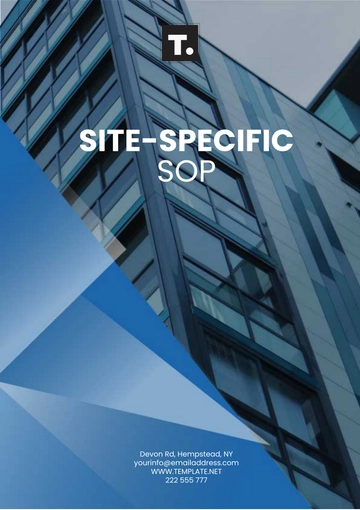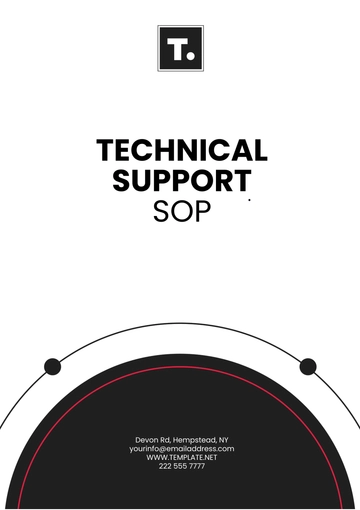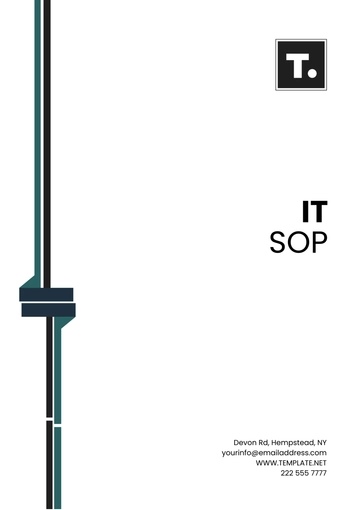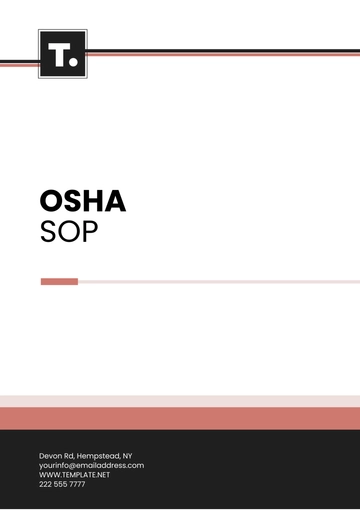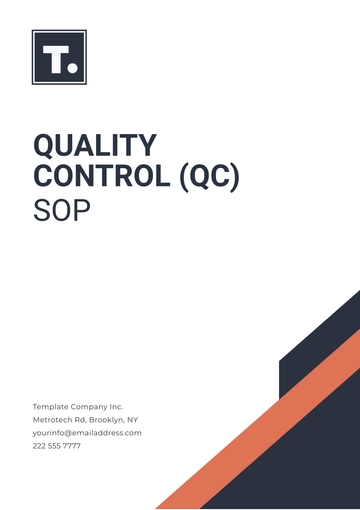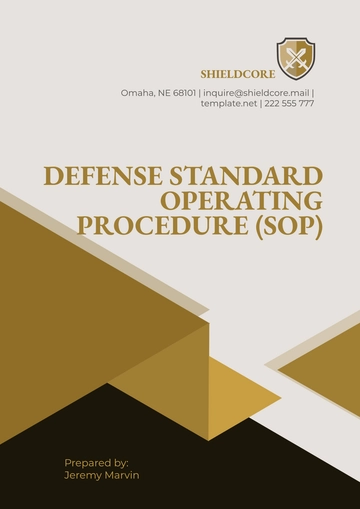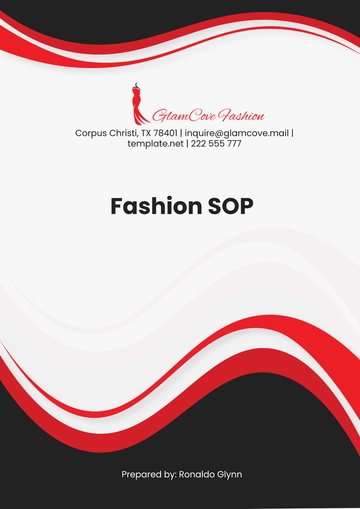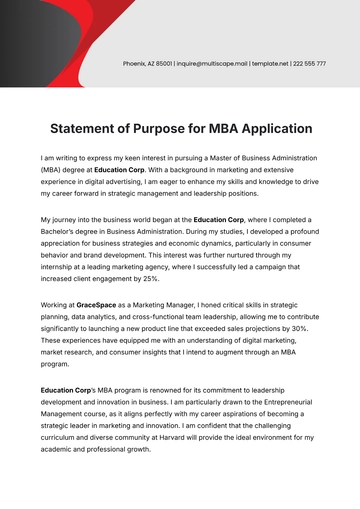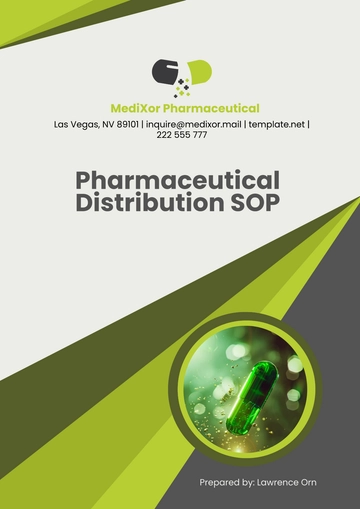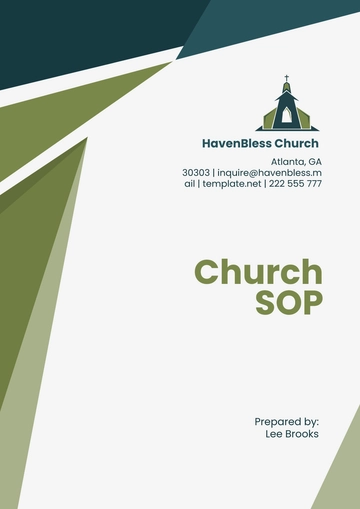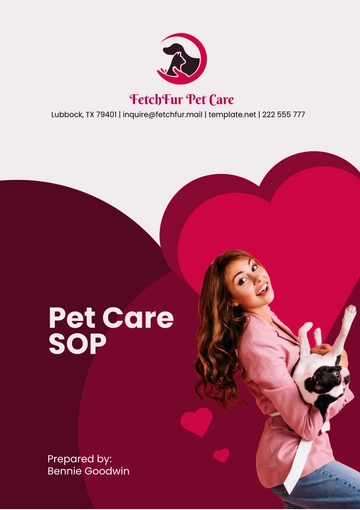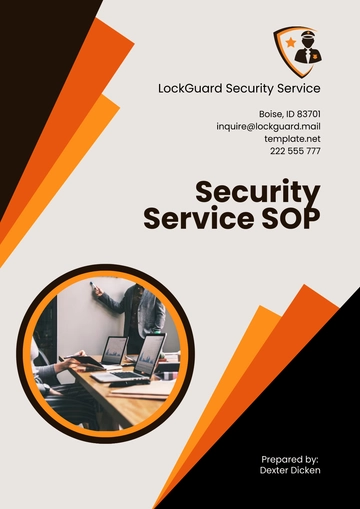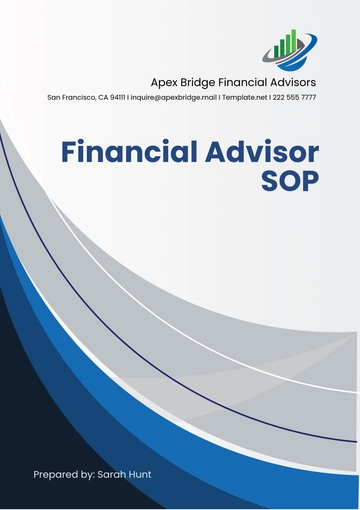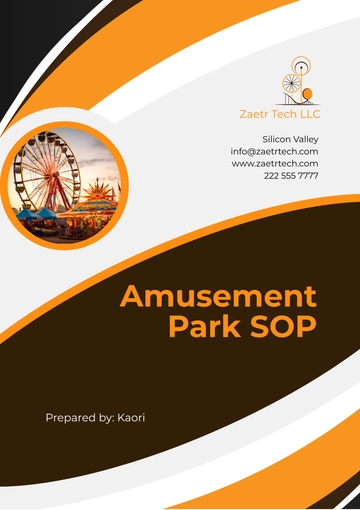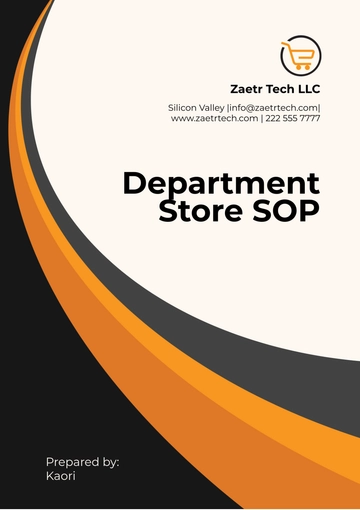Free Car Rental Sales SOP
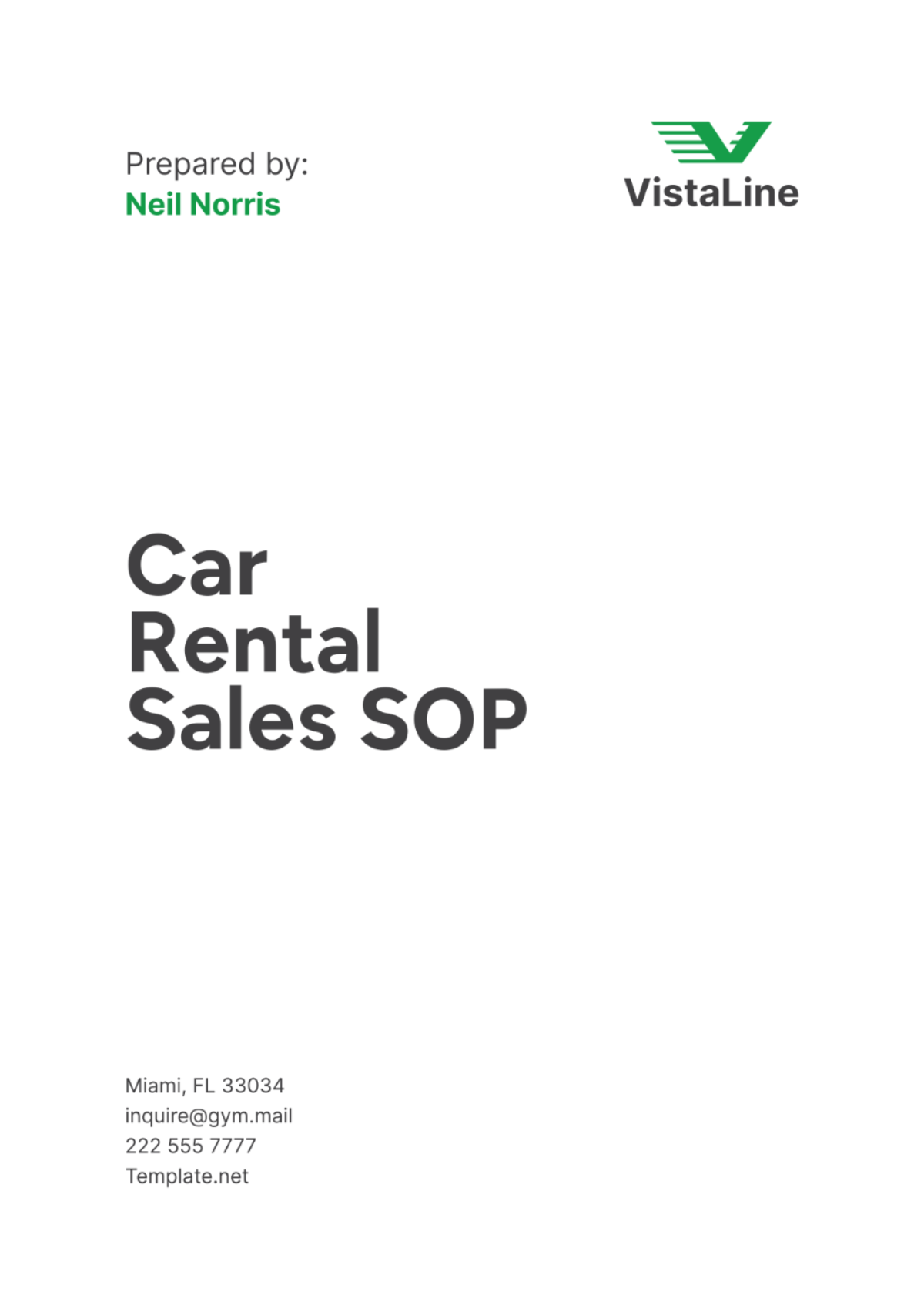
I. Objective
The objective of the Car Rental Sales SOP is to ensure consistent and high-quality service delivery across all customer interactions and sales processes. It aims to standardize procedures for customer inquiries, reservations, vehicle preparation, and after-sales support, thereby enhancing overall customer satisfaction and operational efficiency.
By providing clear guidelines and protocols, the SOP helps in minimizing errors, reducing response times, and ensuring that all staff members are aligned with the company's service standards. It also serves as a training tool for new employees, enabling them to quickly adapt to the company's sales processes. Ultimately, the SOP supports the business's goal of increasing sales, fostering customer loyalty, and maintaining a competitive edge in the car rental market.
II. Scope
This SOP applies to all employees involved in the car rental sales process, encompassing customer service representatives, sales staff, and vehicle maintenance personnel. It outlines the responsibilities and procedures that each role must adhere to, ensuring that every aspect of the customer experience is handled with professionalism and efficiency. By following these guidelines, all team members contribute to a seamless and satisfactory rental process for our clients.
Customer service representatives are responsible for handling inquiries, managing reservations, and providing exceptional support to customers throughout their rental experience. Sales staff are tasked with promoting rental options, upselling additional services, and ensuring that all transactions are completed accurately and efficiently. Vehicle maintenance personnel play a crucial role in preparing vehicles for rental, conducting regular inspections, and addressing any issues to guarantee the safety and reliability of our fleet.
By integrating the efforts of customer service, sales, and maintenance teams, this SOP ensures that [Your Company Name] maintains high standards of service and operational excellence. It provides a comprehensive framework that supports consistent performance, enhances customer satisfaction, and drives business growth. Adherence to this SOP is mandatory for all employees, as it is essential for delivering a superior rental experience and achieving our organizational objectives.
III. Customer Inquiries
Ensuring prompt and detailed responses to customer inquiries is crucial for maintaining customer satisfaction and fostering trust in our services. This section outlines the key protocols for handling customer inquiries, including response times, information provision, and communication tone, to ensure a consistent and professional customer experience.
Task | Description | Responsible Party | Timeline | Standards |
|---|---|---|---|---|
Inquiry Response | Respond to customer inquiries via phone, email, or online chat within 24 hours. | Customer Service Representatives | Within 24 hours | Ensure all inquiries are addressed promptly to meet customer expectations and maintain service quality. |
Information Provision | Provide detailed and accurate information about vehicle availability, pricing, rental terms, and any promotional offers. | Customer Service Representatives | During initial response | Use company-approved scripts and up-to-date information to ensure consistency and reliability. |
Communication Tone | Use a friendly, professional tone in all communications to create a positive and welcoming customer experience. | All Employees | Ongoing | Adhere to the company’s communication guidelines to maintain a professional and approachable demeanor. |
Follow-Up Inquiries | Follow up with customers if additional information is required or if their initial inquiry cannot be resolved immediately. | Customer Service Representatives | As needed | Provide updates and ensure customers are informed of the status of their inquiry until resolution. |
Documentation | Record all customer inquiries and responses in the company’s CRM system for future reference and to track response times and outcomes. | Customer Service Representatives | Immediately after response | Ensure accurate and thorough documentation to support customer service efficiency and accountability. |
Escalation Protocol | Escalate complex inquiries or issues to the appropriate department or manager for resolution if they cannot be addressed at the customer service level. | Customer Service Representatives | As needed | Follow the established escalation procedures to ensure timely and effective resolution of complex issues. |
Feedback Collection | Gather feedback from customers regarding their inquiry experience to identify areas for improvement and enhance service quality. | Customer Service Representatives | Post-interaction | Use customer feedback to continuously improve inquiry handling processes and customer satisfaction. |
IV. Reservations
Ensuring accurate and efficient handling of reservations is essential for a seamless customer experience. This section details the steps and standards for confirming vehicle availability, verifying customer details, and providing reservation confirmations. By adhering to these protocols, we ensure consistency, reliability, and customer satisfaction in our reservation process.
Task | Description | Timeline | Standards |
|---|---|---|---|
Vehicle Availability | Confirm the availability of the requested vehicle type, model, and rental period before proceeding with the reservation. | During initial inquiry | Use the inventory management system to check real-time vehicle availability. |
Customer Details | Verify the customer's personal information, including name, contact details, and driver’s license, as well as the requested rental period and any special requirements. | During reservation process | Ensure all information is accurate and complete to avoid errors and misunderstandings. |
Reservation Confirmation | Provide the customer with a reservation confirmation number once all details are verified and the vehicle availability is confirmed. | Immediately after verification | Generate and communicate a unique reservation number for tracking and reference. |
Confirmation Email | Send a confirmation email to the customer containing the reservation details, including vehicle type, rental period, total cost, and any additional information. | Within 1 hour of reservation | Use a standardized email template to ensure all necessary information is included and clearly presented. |
Reservation Amendments | Allow customers to amend their reservations if needed, including changes to rental period, vehicle type, or personal details, and confirm these changes accordingly. | As needed | Provide prompt updates and confirmations for any reservation changes requested by the customer. |
Pre-Rental Reminders | Send reminder emails to customers 24-48 hours before their rental period begins, including reservation details and any necessary instructions or reminders. | 24-48 hours before rental | Use automated email systems to ensure timely and consistent communication with customers. |
Cancellation Protocol | Handle reservation cancellations promptly, ensuring that customers are informed of any applicable cancellation policies and potential fees. | As needed | Follow the company's cancellation policy and provide clear information to the customer. |
Documentation | Record all reservation details and communications in the company’s CRM system for future reference and to track reservation history and customer interactions. | Immediately after reservation | Maintain accurate records to support operational efficiency and customer service quality. |
V. Vehicle Preparation
Ensuring that vehicles are thoroughly prepared before rental is crucial for delivering a high-quality customer experience. This section outlines the procedures for inspecting cleanliness, checking maintenance, fueling, documenting existing damage, and placing necessary documents and keys in the vehicle. Adherence to these protocols guarantees that customers receive vehicles in optimal condition.
Task | Description | Responsible Party | Timeline | Standards |
|---|---|---|---|---|
Vehicle Inspection | Inspect the vehicle for cleanliness, both interior and exterior, and check for any maintenance issues or irregularities. | Maintenance Personnel | Before each rental | Use a standardized checklist to ensure all aspects of the vehicle are in proper condition. |
Fuel Check | Ensure the vehicle has a full tank of fuel before it is handed over to the customer. | Maintenance Personnel | Before each rental | Fill the tank to full capacity to avoid customer inconvenience and maintain service quality. |
Damage Documentation | Document any existing damage on the vehicle, including scratches, dents, or other imperfections, using a detailed inspection report. | Maintenance Personnel | Before each rental | Record all findings in the company’s damage log and provide a copy to the customer if requested. |
Rental Agreement & Keys | Place the rental agreement, a copy of the inspection report, and the keys in the vehicle, ensuring they are easily accessible to the customer. | Maintenance Personnel | Before each rental | Ensure all documents are accurate and present, and that the keys are placed securely in the vehicle. |
Final Quality Check | Conduct a final quality check to confirm that all preparation tasks have been completed and the vehicle is ready for customer pick-up. | Maintenance Supervisor | Before each rental | Verify that all steps have been followed and the vehicle meets all company standards for rental. |
Customer Notification | Notify the customer that the vehicle is ready for pick-up, including any important information or instructions related to their rental. | Customer Service Representatives | Before pick-up | Use a standardized notification process to ensure clear and consistent communication with customers. |
Documentation | Record all preparation activities and inspections in the company’s CRM system to maintain accurate service records and support operational efficiency. | Maintenance Personnel | Immediately after preparation | Maintain thorough documentation for accountability and quality control. |
Post-Rental Inspection | Conduct a post-rental inspection upon vehicle return to assess any new damage and ensure it is ready for the next rental cycle. | Maintenance Personnel | After each rental | Use the same standardized checklist to maintain consistency and service quality across all rentals. |
VI. Customer Pickup
A smooth and professional customer pickup process is essential for ensuring a positive rental experience. This section outlines the steps for verifying customer identification, reviewing the rental agreement, conducting a vehicle walkaround, and providing an overview of the vehicle’s features. By following these protocols, we ensure that customers are well-informed and confident in their rental.
Task | Description | Timeline | Standards |
|---|---|---|---|
Customer Identification | Verify the customer's identification by checking their driver’s license and any other required documents to ensure accuracy and eligibility. | During pickup | Ensure all documents are valid and match the reservation details. |
Rental Agreement Review | Review the rental agreement with the customer, highlighting key terms and conditions, rental period, and any additional services or insurance purchased. | During pickup | Use a standardized script to ensure all important points are clearly communicated and understood. |
Vehicle Walkaround Inspection | Escort the customer to the vehicle and conduct a thorough walkaround inspection, noting any existing damage and ensuring the customer acknowledges it. | During pickup | Use the inspection report to document and confirm the condition of the vehicle with the customer. |
Feature Overview | Provide an overview of the vehicle’s features and controls, including essential functions like lights, wipers, fuel type, and navigation system, if applicable. | During pickup | Ensure the customer is comfortable and familiar with the vehicle’s operation before they depart. |
Customer Questions | Address any questions or concerns the customer may have regarding the rental agreement, vehicle operation, or rental period. | During pickup | Provide clear and concise answers, ensuring the customer feels confident and informed. |
Final Verification | Perform a final verification of all documents and ensure the customer has everything they need, including the rental agreement, keys, and any accessories. | Before departure | Confirm all paperwork is complete and the customer is fully prepared for their rental. |
Documentation | Record all customer interactions, inspections, and confirmations in the company’s CRM system for future reference and to track service quality. | Immediately after pickup | Maintain thorough documentation to support operational efficiency and customer service quality. |
Post-Pickup Follow-Up | Send a follow-up email or message to the customer shortly after pickup to ensure they are satisfied and address any immediate concerns or issues. | Within 24 hours of pickup | Use automated systems to ensure timely and consistent communication, enhancing customer satisfaction. |
VII. After-Sales Support
Effective after-sales support is crucial for ensuring ongoing customer satisfaction and loyalty. This section outlines the steps for following up with customers after vehicle return, addressing any concerns, and maintaining records of customer feedback. By adhering to these protocols, we ensure a consistent and professional after-sales experience that fosters customer trust and loyalty.
Task | Description | Responsible Party | Timeline | Standards |
|---|---|---|---|---|
Follow-Up Communication | Follow up with the customer within 48 hours of vehicle return to gather feedback and ensure their rental experience was satisfactory. | Customer Service Representatives | Within 48 hours of return | Use standardized follow-up templates to ensure all relevant questions are covered and feedback is obtained. |
Issue Resolution | Address any concerns or issues raised by the customer promptly and efficiently, providing appropriate solutions or compensation if necessary. | Customer Service Representatives | As soon as issues are raised | Follow company protocols for issue resolution to ensure a fair and consistent approach to customer service. |
Feedback Documentation | Maintain a detailed record of all customer feedback, including positive comments and areas for improvement, to support ongoing quality improvement efforts. | Customer Service Representatives | Immediately after follow-up | Use the company’s CRM system to accurately log all feedback and track trends over time for quality improvement. |
Service Recovery | Implement service recovery procedures for customers who had a negative experience, including personalized apologies and special offers to regain their trust. | Customer Service Representatives | As needed | Follow the company’s service recovery guidelines to turn negative experiences into positive outcomes. |
Trend Analysis | Regularly analyze feedback data to identify common trends and areas for improvement, and report findings to management for strategic decision-making. | Customer Service Representatives | Monthly | Use feedback analysis reports to inform training programs, policy adjustments, and service enhancements. |
Continuous Improvement | Incorporate customer feedback into ongoing training and development programs for staff to continuously enhance service quality and customer satisfaction. | Customer Service Representatives | Ongoing | Ensure feedback is actively used to improve processes, procedures, and customer interactions. |
Customer Loyalty Programs | Offer incentives or loyalty programs to repeat customers as a token of appreciation for their continued business and to encourage repeat rentals. | Marketing Team | As part of follow-up | Develop and promote customer loyalty initiatives to foster long-term relationships and repeat business. |
Documentation | Record all follow-up communications and resolutions in the company’s CRM system to ensure a complete history of customer interactions and service quality. | Customer Service Representatives | Immediately after follow-up | Maintain thorough documentation for accountability, quality control, and future reference. |
VIII. Training
Comprehensive training is essential for ensuring that all employees understand and adhere to the SOP. This section outlines the procedures for providing new employees with the SOP, conducting regular training sessions, and encouraging feedback for continuous improvement. By following these protocols, we ensure that our team is well-equipped to deliver consistent and high-quality service.
Task | Description | Responsible Party | Timeline | Standards |
|---|---|---|---|---|
SOP Distribution | Provide new employees with a copy of the SOP during their onboarding process to familiarize them with company policies and procedures. | HR Department | During onboarding | Ensure all new hires receive and acknowledge receipt of the SOP as part of their initial training. |
Initial Training Session | Conduct an initial training session for new employees to review the SOP in detail, answer questions, and demonstrate key procedures. | Training Coordinator | Within first week of employment | Use standardized training materials and checklists to ensure comprehensive coverage of all SOP topics. |
Regular Training Sessions | Schedule regular training sessions for all employees to review and update procedures, ensuring that everyone remains current with any changes or updates. | Training Coordinator | Quarterly | Ensure training sessions are interactive and cover any new updates or identified areas for improvement. |
Feedback Collection | Encourage employees to provide feedback on the SOP during training sessions and through regular feedback channels to identify potential improvements. | Training Coordinator | Ongoing | Use feedback forms and surveys to systematically collect and analyze employee suggestions. |
SOP Updates | Regularly review and update the SOP based on employee feedback, changes in industry standards, and operational needs to keep it relevant and effective. | SOP Review Committee | Annually | Ensure all updates are communicated to employees and integrated into the training program. |
Continuous Improvement | Incorporate feedback and updates into ongoing training and development programs to continuously enhance staff knowledge and adherence to SOP. | Training Coordinator | Ongoing | Use feedback and performance metrics to guide improvements in training content and delivery. |
Documentation of Training | Maintain accurate records of all training sessions, including attendance, topics covered, and feedback received, to ensure accountability and compliance. | HR Department | Immediately after training sessions | Use the company’s training management system to log all training activities and outcomes. |
Performance Monitoring | Monitor employee performance to ensure adherence to SOP and identify any additional training needs or areas for improvement. | Supervisors and Managers | Ongoing | Use performance reviews and observational assessments to evaluate SOP compliance and training efficacy. |
On-Demand Training Resources | Provide access to on-demand training resources, such as online modules and instructional videos, to support continuous learning and development. | Training Coordinator | Ongoing | Ensure resources are easily accessible and cover all relevant SOP topics for convenient employee reference. |
IX. Performance Metrics
Monitoring performance metrics is essential for evaluating operational effectiveness and ensuring high standards of service delivery. This section outlines key performance metrics, their respective targets, and their significance in maintaining operational excellence and customer satisfaction.
Metric | Target | Significance |
|---|---|---|
Response Time to Inquiries | 24 hours | Ensures timely and efficient handling of customer inquiries, enhancing customer satisfaction. |
Customer Satisfaction Score | 90% or above | Reflects the overall satisfaction level of customers, indicating the quality of service provided. |
Reservation Accuracy | 99% | Demonstrates precision in fulfilling customer requests, reducing errors and enhancing reliability. |
Vehicle Preparation Time | 1 hour | Minimizes wait times for customers, ensuring vehicles are ready promptly for rental. |
These metrics serve as benchmarks for measuring performance and guiding continuous improvement efforts across all aspects of our car rental operations. Regular monitoring and analysis of these metrics enable us to identify areas for enhancement and maintain high standards of service excellence.
X. Continuous Improvement
Continuous improvement is integral to maintaining competitiveness and enhancing service quality. This section outlines strategies for regularly reviewing and updating the SOP, engaging employees in the process, and leveraging customer feedback and performance metrics to drive improvements.
Strategy | Description |
|---|---|
Regular SOP Review | Conduct periodic reviews of the SOP to incorporate industry best practices, regulatory updates, and operational efficiencies. |
Employee Engagement | Encourage active participation of employees in SOP reviews and updates through feedback sessions and collaborative discussions. |
Customer Feedback Integration | Integrate insights from customer surveys and performance metrics into SOP updates to address service gaps and enhance customer satisfaction. |
These strategies ensure that our SOP remains relevant, efficient, and aligned with both industry standards and customer expectations. By fostering a culture of continuous improvement, we aim to deliver exceptional service and maintain a competitive edge in the car rental industry.
- 100% Customizable, free editor
- Access 1 Million+ Templates, photo’s & graphics
- Download or share as a template
- Click and replace photos, graphics, text, backgrounds
- Resize, crop, AI write & more
- Access advanced editor
Enhance your car rental sales processes with Template.net’s Car Rental Sales SOP Template. This fully customizable and editable document is designed to streamline operations and boost efficiency. Easily editable in our AI Editor Tool, this template makes it simple to adapt to your specific needs. Maximize sales potential and ensure seamless transactions today.
